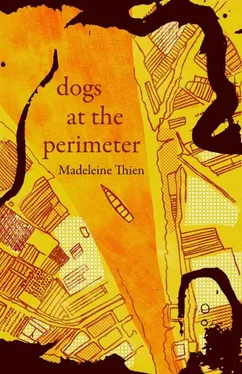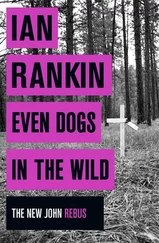“It’s religious,” he had said finally, lacking words.
Hiroji said, “I like it too.”
In the narrow glow of the flashlight, Hiroji’s face was round and small.
James wanted to tell him, “I’m not your father. You don’t have to look at me like that. You can yell at me and tell me I’m a fake.”
Instead he said, “You didn’t pack your schoolbooks, did you?”
Hiroji looked at him nervously. “Just a few.”
“I’m going to lock them in the Datsun.”
“Ha ha,” his brother said.
“Ha ha,” James answered.
The rain started. It drummed the ocean, it slipped through the high canopy of trees and reached their tent, a tapping of needles.
“Ichiro,” his brother said tentatively. “Do we need to sleep in the car?”
“No, brother,” James said. “It’s fine. I chose a good place for us.” James reached his fingers up and touched the tent walls, they were heavy with moisture, rain filling up all the pores, soon the wet would force its way through.
“Just close your eyes and get some sleep. The light will wake us early tomorrow.”
“Okay,” his brother said. “Okay, James.”
He felt, sometimes, like Hiroji’s father, as if the best part of his youth had already gone by. But these moments were fleeting. James was only seventeen after all, he was just a kid.
It rained all night. Sometimes he heard voices floating through the schoolhouse, he heard trucks stalling in the mud outside. James knew they would come for him in the middle of the night, slash his throat, and push his body into a pit before he was even alert enough to be afraid. He didn’t want to die in the unthinking mud. He couldn’t let this happen because there were people relying on him. There was Sorya and the promises he had made.
Kwan, this stranger, came to him in the shape of his brother and leaned his body against the far wall. His black hair fell forward over his eyes, his skin was the colour of cedar, he had thin lips and high, faint eyebrows. Every movement he made was precise, as if wasted movement itself was a crime, like spilled water in a time of drought. Kwan had Hiroji’s watchful eyes. He was the opposite of James, he was not reckless or weak or self-pitying. Kwan took his time because he knew that the seconds were precious, doing the right thing in the right moment, every single time, was the only thing that could save him.
He studied Kwan and remembered his kid brother, the way Hiroji never spoke out of turn, never spoke without some prodding. If you didn’t know him as James did, you would have thought that Hiroji was a bit slow, a bit dull, but really he was constantly rearranging things in his mind, he was opening and filing the information as it arrived, rather than letting it overflow and become meaningless. Yes, his brother was careful and he had been that way even when he was small. In the corner of the room, Hiroji, or was it Kwan or was it some metamorphosis of the two or was it James as he once was, the James that might have grown up in Tokyo with a father and a language of his own, with a box in his heart to hide his fear, shifted his weight and knelt on the ground so now they could see each other clearly, on the same level. The boy studied him. There was one man in this room and one ghost. When James woke at the next knocking on the door, it was still pouring, rain was running thinly across the floor, cupping the light all to itself.
“Kwan?” the man’s voice said.
James made no answer.
“Kwan?”
James reached out and plucked the weeds growing through cracks, he ate them and drank, foolishly, the dirty groundwater. Eventually, he heard the sound of the man’s rubber sandals on the concrete landing, walking away. James’s clothes were wet and they stank of the earth outdoors.
There’s a room full of injured people and it brims with rot and excrement. The man brings James here in the middle of the night but what the hell is he supposed to do with no drugs, no nothing, barely even light to work by. He throws his hands up in frustration but the man doesn’t seem to get it, he just watches expectantly as if James is Jesus with forty loaves at his beck and call. Forty ampoules. If James resists he’ll get them all killed. He has no choice but to clean the wounds, dress them with scraps of cloth torn from the patients’ own clothing, with wet cardboard or their filthy, multi-purpose kramas. He thinks in detail about his brother, his mother, and no one seems to notice his tears, a liquid, he believes, that is rich in painkillers. He attempts to clean the broken skin with the salinity of the fluid.
Sometimes the patients are Khmer Rouge cadre and sometimes they are prisoners who are only being prepared for the next round of interrogation. Before, in Canada, he never wondered how many deaths we can survive, how many deaths we can bear, how many deaths we deserve. He doesn’t know what to do with the children who have become as blank-eyed as the adults.
A blade of morning light falls in between the wall and the ceiling. The man, they call him Chorn, escorts James back to the storeroom. Before he leaves, the man orders in a bowl of rice soup.
“Good night, Kwan,” Chorn says through the locked door. James doesn’t answer. On the floor, beside his food, is a letter. It is a single, lined page torn from a notebook. He recognizes Sorya’s handwriting long before he deciphers the Khmer words. The letter is bare of details. It is written to him. She must be here, in Cambodia, somewhere. She did not escape to Bangkok. Sorya writes, They told me that you are safe. That you survived .
When Chorn returns at nightfall, James says, “What is this?” He has to control every word or they will overflow and hurt him. He says again, “What is this?”
“I can bring you a letter now and then. This is all I can do.”
The words don’t make sense to James. They don’t tell him how the letter got here, or what it means. He picks up the sheet of paper, turns it over, looks for the information that is missing.
“Can you bring her?”
“That depends,” the man says.
James takes a breath and the fetid air sinks sharply into his lungs. “You want to make every one of us small. Every one of us like you. Is that it?”
Chorn says nothing, he closes his eyes. He has a sharp face, a beak of a nose, and long, dark lashes, he has an armoured quiet that nothing James understands can penetrate.
“Listen,” Chorn says. His voice is low and the words come so fast, they seem to evaporate as soon as he speaks. “Listen. I’m trying to help you. There is no other way. You want to know what we need from you? Everyone has to work. That’s all. It’s simple. There is no divide any longer between work and life, between life and death, between you and the world, between the world and Angkar. If you act correctly, you are the enemy, if you act incorrectly, you are the enemy. These are Angkar’s own words. Can’t you see that I’m trying to help you? A long time ago you were my friend. Don’t you remember?”
James falters. He says, “You can protect her.”
Chorn shakes his head. There’s emotion on his face, like a mask that keeps slipping, that he pushes into place or removes at will. James is staring straight into his eyes and the man looks down.
“You still don’t understand,” Chorn says. “Unless you understand, we will both be accused. Not just her, but you and I as well. In Phnom Penh, you protected me. I never forgot.”
James tries to wipe the fog, the dust, from his thoughts.
“How did you get this letter? Explain it to me.”
“I have all the paper,” Chorn says, lifting his hands, opening his fingers. “All the paper in this district, all the files, are here.”
Chorn touches James’s shoulder and the shock of the gesture blinds him awake.
Читать дальше












